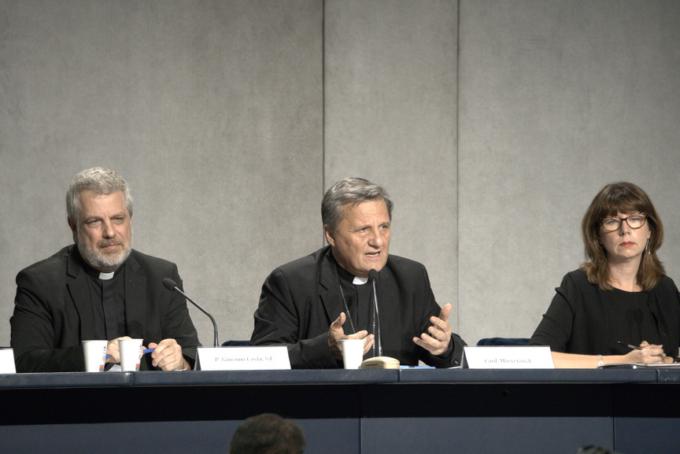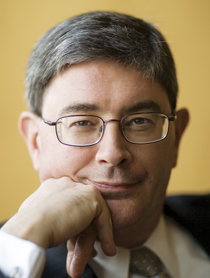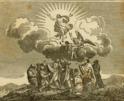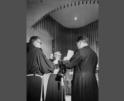
Culture
Over and over, the IL explores what a "listening" Church -- with which it identifies "synodality" -- does.

Weigel
It would not be quite accurate to describe the Working Document for the October 2023 Synod (its "Instrumentum Laboris," or IL) as "disappointing." No one who has followed the "synodal process" underway since 2021 could reasonably have expected an IL of spiritual depth and evangelical passion -- an IL that reflected Pope Francis's early summons to the Church to be "permanently in mission:" a Church of missionary disciples bringing the Good News that "the Kingdom of God is among you" (Luke 17:21) to a world suffering from its allegiance to false gods.
The better description of the IL, it seems to me, is that it's vacuous: a great deal of clotted, trendy sociologese with a thin veneer of Christian language and imagery. The net result is a portrait of the Church that rather completely misses the central teaching of the Second Vatican Council.
How is the IL vacuous? Let me count (some of) the ways:
The IL is Christologically vacuous. Subtract the few passing references to the Lord Jesus, and the IL reads as if it were prepared for an international non-governmental organization seeking to increase members and donors for its program of good works. The IL occasionally traces its lineage to Vatican II's Dogmatic Constitution on the Church. Yet that fundamental text begins, "Jesus Christ is the light of the nations." No such affirmation appears in the IL, which is steeped in the ecclesiocentrism -- the self-referentiality -- once deplored by Pope Francis. Vatican II was profoundly Christocentric; the IL is anything but Christ-centered.
The IL is pneumatologically vacuous. The IL speaks at length of "conversation in the Spirit" in which "the Holy Spirit makes his own voice resound." But the IL says nothing about how the Church differentiates between the authentic voice of the Holy Spirit and the spirit of the age, which St. Paul warned the Romans to avoid (cf. Romans 12:2). Nor does the IL affirm that the "voice of the Holy Spirit" can never be self-contradictory, teaching the Church one thing at a particular historical moment and its opposite at another. The IL speaks at some length about "discernment," but does not explain why the "discernment" that has taken place over the past two years of the synodal process yields the agenda of the evangelically moribund Catholic Lite project, the charred ruins of which are evident in Germany.
The IL is ecclesiologically vacuous. Over and over, the IL explores what a "listening" Church -- with which it identifies "synodality" -- does. Very little is said about a teaching Church fulfilling the Master's command in the Great Commission: "Go and make disciples of all nations . . . Teaching them to observe all that I have commanded you" (Matthew 28:19-20). The Church's ordained pastors seem reduced to what the IL describes as "facilitators capable of accompanying communities in practicing [conversation in the Spirit] as a priority at all levels of ecclesial life..." Moreover, the IL fails to address two questions raised numerous times during this "synodal process:" How can a Church permanently in meetings be a Church permanently in mission? And how can a process in which (at best) 1 percent of the Church has participated be considered an expression of the sensus fidelium, the "sense of the faithful?"
The IL is woefully lacking in moral theology. There is no statement in the IL that the Beatitudes are the Magna Carta of the Christian moral life, or that the Ten Commandments and the moral teaching of the Church are guideposts leading us to personal happiness, social solidarity, and ultimately beatitude: eternal life within the light and love of the Thrice-Holy God. Rather, the "listening" to which the IL summons the Synod of October 2023 seems largely directed to questioning the enduring, binding character of moral truths the Church has taught definitively, on the basis of both revelation and reason.
The IL is methodologically childish. The "Synodal Assembly" in October 2023 will have little or no freedom to define its purpose or agenda. These have been defined already by a series of "Worksheets" appended to the IL, which pose questions the members of the Assembly are instructed to address in plenary sessions and language-based working groups. (And who can doubt that the latter will be provided with "facilitators" by the Synod General Secretariat?) The general impression the IL Worksheets give is that the Synodal Assembly will be something akin to a kindergarten classroom: "Color between the lines, girls and boys."
There is much in the Church in need of renewal and reform. The Working Document for the Synod on Synodality does not advance that cause. Nor does it reflect the Christocentric teaching and spirit of Vatican II.
- George Weigel is Distinguished Senior Fellow of the Ethics and Public Policy Center in Washington, D.C.
Recent articles in the Culture & Events section
-
Building a legacyMichael Reardon
-
Scripture Reflection for Nov. 24, 2024, Solemnity of Our Lord Jesus Christ, King of the UniverseDeacon Greg Kandra
-
Seeds of graceMolly M. Wade
-
The dedication of St. Francis Chapel in the Prudential CenterThomas Lester
-
Honeybees are taking over for canariesDeacon Timothy Donohue


















